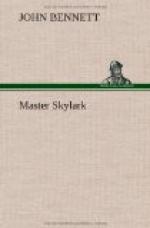“Here, fellow, stand aside,” commanded Master Carew, haughtily. “Stand aside and let me pass!” As he spoke he clapped his hand upon his poniard with a fierce snarl, showing his white teeth like a wolf-hound.
The men about him fell back with unanimous alacrity, making out each to put himself behind the other. But the huge smith only puffed out his sooty cheeks as if to blow a fly off the next bite of cheese. “So-oftly, so-oftly, muster,” drawled he; “do na go to ruffling it here. This shop be mine, and I be free-born Englishman. I’ll stand aside for no swash-buckling rogue on my own ground. Come, now, what wilt thou o’ the lad?—and speak thee fair, good muster, or thou’lt get a dab o’ the red-hot shoe.” As he spoke he gave the black tongs an extra whirl.
CHAPTER XV
LONDON TOWN
“Come,” growled the blacksmith, gripping his tongs, “what wilt thou have o’ the lad?”
“What will I have o’ the lad?” said Master Carew, mimicking the blacksmith in a most comical way, with a wink at the crowd, as if he had never been angry at all, so quickly could he change his face—“What will I have o’ the lad?” and all the crowd laughed. “Why, bless thy gentle heart, good man, I want to turn his farthings into round gold crowns—if thou and thine infernal hot shoe do not make zanies of us all! Why, Master Smith, ’tis to London town I’d take him, and fill his hands with more silver shillings than there be cast-off shoes in thy whole shop.”
“La, now, hearken till him!” gaped the smith, staring in amazement.
“And here thou needs must up and spoil it all, because, forsooth, the silly child goes a trifle sick for home and whimpers for his minnie!”
“But the lad saith thou hast stealed him awa-ay from ’s ho-ome,” rumbled the smith, like a doubtful earthquake; “and we’ll ha’ no stealing o’ lads awa-ay from ho-ome in County Herts!”
“Nay, that we won’t!” cried one. “Hurrah, John Smith—fair play, fair play!” and there came an ugly, threatening murmur from the crowd.
“What! Fair play?” cried Master Carew, turning so sharply about, with his hand upon his poniard, that each made as if it were not he but his neighbor had growled. “Why, sirs, what if I took any one of ye out of your poverty and common clothes down into London town, horseback like a king, and had ye sing before the Queen, and play for earls, and talk with the highest dames in all the land; and fed ye well, and spoke ye fair, and lodged ye soft, and clad ye fine, and wrought the whole town on to cheer ye, and to fill your purses full of gold? What, sir,” said he, turning to the gaping farrier—“what if I promised thee to turn thine every word to a silver sixpence, and thy smutty grins to golden angels—what wouldst thou? Knock me in the head with thy dirty sledge, and bawl foul play?”
“Nay, that I’d not,” roared the burly smith, with a stupid, ox-like grin, scratching his tousled head; “I’d say, ’Go it, bully, and a plague on him that said thee nay!’”




